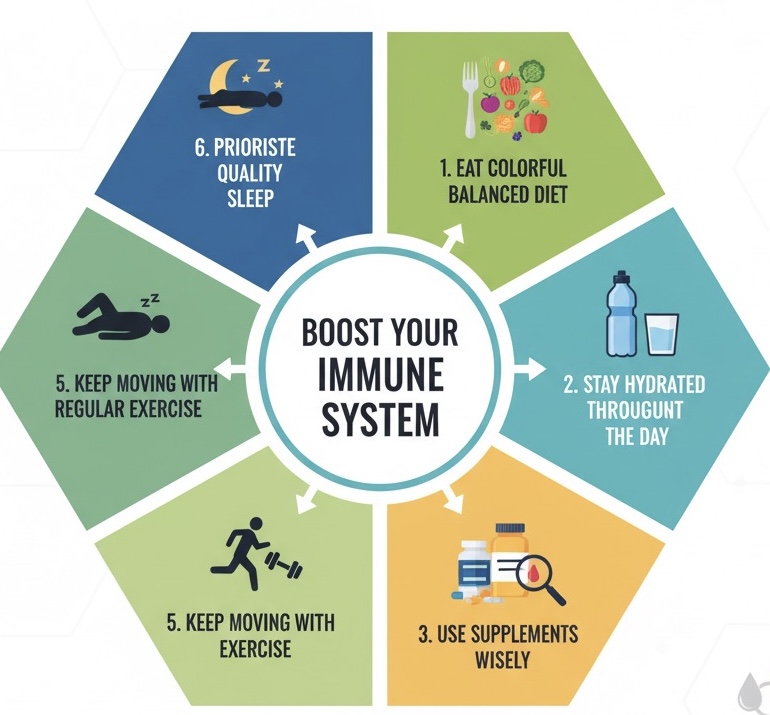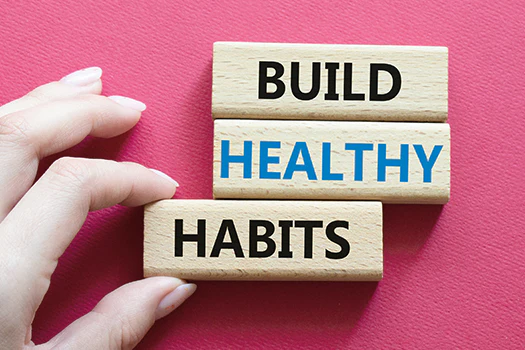
We often see ads and articles that claim to “boost your immune system.” But what does that really mean — and is that even possible?
The immune system isn’t a single organ or a button you can switch on. It’s a complex network of organs, cells, and proteins that work together to protect you from infections and illnesses.
Cara Anselmo, a clinical dietitian nutritionist at Memorial Sloan Kettering Cancer Center, explains that the goal shouldn’t be to boost immunity but to maintain balance.
Even for people undergoing cancer treatments, who often have weakened immune systems, the aim is not to overactivate it but to keep it functioning properly through healthy daily habits. “Think of it as maintaining a healthy body rather than boosting the immune system,” Anselmo says.
1. Eat a Colorful, Balanced Diet
No single food can protect you from sickness, but a varied, nutrient-rich diet can help your body stay strong.
Vitamin C is one of the best-known immune-supporting nutrients. It helps white blood cells fight infection and protects cells from damage caused by free radicals. Instead of just oranges, try adding foods like bell peppers, strawberries, kiwi, or tomatoes to your meals.
Cruciferous vegetables such as broccoli, cauliflower, kale, and Brussels sprouts reduce inflammation, while garlic, onions, and scallions offer similar anti-inflammatory benefits.
Protein — from both animal and plant sources — is essential for building and repairing tissues, helping your body stay resilient against viruses and bacteria.
2. Stay Hydrated Throughout the Day
Hydration plays a big role in immune function. Water keeps your mucus membranes — the protective layers in your nose, mouth, eyes, and internal organs — moist and effective at blocking germs.
You don’t necessarily need to drink eight glasses daily; just aim to drink regularly and listen to your body’s signals for thirst. Herbal teas, soups, and water-rich fruits like cucumber and oranges also count toward your hydration needs.
3. Use Supplements Wisely
Supplements can be helpful for specific deficiencies, but they can’t replace a healthy diet. Some, like vitamin D, are especially useful during the darker months when sunlight is limited.
However, Anselmo warns that many so-called “immune-boosting” supplements can be misleading or even harmful in high doses. Always consult your doctor before taking any new vitamins, minerals, or herbal products.
4. Check Your Vitamin D Levels
Vitamin D does more than support strong bones — it’s also vital for immune function. It helps activate T cells and macrophages, the white blood cells responsible for attacking harmful pathogens.
Because sunlight is the main source of vitamin D, many people become deficient during winter. Even fortified foods like milk often aren’t enough. A simple blood test can help your doctor determine if you need a supplement and what dosage is right for you.
5. Keep Moving with Regular Exercise

Exercise doesn’t just tone your muscles — it also boosts circulation, clears bacteria from your airways, and lowers stress hormones that can weaken your immune response.
You don’t need an intense workout routine. Walking, yoga, or light strength training for 30 minutes a day is enough to improve your overall immunity. “Start slow and increase gradually,” says Anselmo. “Consistency is key.”
6. Prioritize Quality Sleep
Sleep is when your body repairs and regenerates. During rest, your immune system releases proteins that strengthen its ability to fight infection.
Skipping sleep weakens your defenses and increases your risk of getting sick. Aim for 7–9 hours per night, and if you nap during the day, keep it under 30 minutes to protect your natural sleep rhythm.
Final Takeaway
There’s no miracle supplement or food that can instantly “boost” immunity. True immune strength comes from daily habits — nutritious eating, regular exercise, hydration, rest, and stress control.
As Cara Anselmo reminds us, “A healthy immune system is simply a reflection of a healthy body.” Focus on balance, and your immunity will follow.


